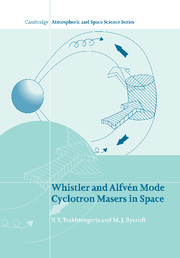Book contents
- Frontmatter
- Contents
- Preface
- Chapter 1 Introduction
- Chapter 2 Basic theory of cyclotron masers (CMs)
- Chapter 3 Linear theory of the cyclotron instability (CI)
- Chapter 4 Backward wave oscillator (BWO) regime in CMs
- Chapter 5 Nonlinear wave–particle interactions for a quasi-monochromatic wave
- Chapter 6 Nonlinear interaction of quasi-monochromatic whistler-mode waves with gyroresonant electrons in an inhomogeneous plasma
- Chapter 7 Wavelet amplification in an inhomogeneous plasma
- Chapter 8 Quasi-linear theory of cyclotron masers
- Chapter 9 Non-stationary CM generation regimes, and modulation effects
- Chapter 10 ELF/VLF noise-like emissions and electrons in the Earth's radiation belts
- Chapter 11 Generation of discrete ELF/VLF whistler-mode emissions
- Chapter 12 Cyclotron instability of the proton radiation belts
- Chapter 13 Cyclotron masers elsewhere in the solar system and in laboratory plasma devices
- Epilogue
- Systems of units, conversion factors and useful numerical values
- Glossary of terms
- Abbreviations and acronyms
- Bibliography
- Index
Chapter 2 - Basic theory of cyclotron masers (CMs)
Published online by Cambridge University Press: 02 May 2010
- Frontmatter
- Contents
- Preface
- Chapter 1 Introduction
- Chapter 2 Basic theory of cyclotron masers (CMs)
- Chapter 3 Linear theory of the cyclotron instability (CI)
- Chapter 4 Backward wave oscillator (BWO) regime in CMs
- Chapter 5 Nonlinear wave–particle interactions for a quasi-monochromatic wave
- Chapter 6 Nonlinear interaction of quasi-monochromatic whistler-mode waves with gyroresonant electrons in an inhomogeneous plasma
- Chapter 7 Wavelet amplification in an inhomogeneous plasma
- Chapter 8 Quasi-linear theory of cyclotron masers
- Chapter 9 Non-stationary CM generation regimes, and modulation effects
- Chapter 10 ELF/VLF noise-like emissions and electrons in the Earth's radiation belts
- Chapter 11 Generation of discrete ELF/VLF whistler-mode emissions
- Chapter 12 Cyclotron instability of the proton radiation belts
- Chapter 13 Cyclotron masers elsewhere in the solar system and in laboratory plasma devices
- Epilogue
- Systems of units, conversion factors and useful numerical values
- Glossary of terms
- Abbreviations and acronyms
- Bibliography
- Index
Summary
The purpose of this chapter is to formulate the self-consistent set of equations (expressed in cgs units) which describe the theoretical behaviour of cyclotron masers operating in a plasma constrained by a dipole magnetic field. Thus the equation of motion of a non-relativistic charged particle is considered; the first adiabatic invariant of motion is the magnetic moment, and the second is the bounce integral. The charged particle distribution function approach is then presented.
The general dispersion relation for electromagnetic waves propagating in a plasma is derived. From this expressions are obtained for the refractive index and polarization parameters of whistler-mode waves and of Alfvén waves. These lead to the wave eigenmodes (natural, or resonant, oscillations) in an operating cyclotron maser. Due to the current of hot particles in gyroresonance with the wave, a monochromatic wave is an evolving wave packet. Its amplitude changes slowly with time; the wave packet propagates at the group velocity.
The theory is derived first for a homogeneous plasma for which the plasma density and the ambient magnetic field do not vary with any spatial coordinate. Secondly it is extended to an inhomogeneous plasma, specifically to plasma and energetic charged particles confined by a dipole magnetic field such as the Earth's.
- Type
- Chapter
- Information
- Whistler and Alfvén Mode Cyclotron Masers in Space , pp. 8 - 32Publisher: Cambridge University PressPrint publication year: 2008



